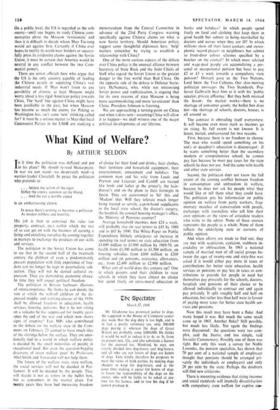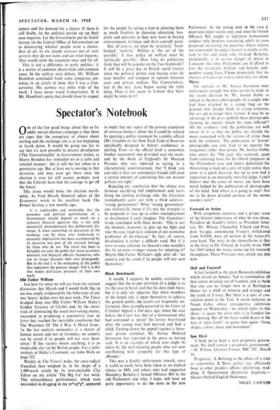What Kind of Welfare?
By ARTHUR SELDON
Is it time the politician was deflated and put in his place? He should re-read Shakespeare. In war we can stand—we desperately need—a warrior-leader Churchill. In peace the politician who pretends to . . . imitate the action of the tiger: Stiffen the sinews, summon up the blood, . . . lend the eye a terrible aspect
is an embarrassing clown.
In peace there's nothing so becomes a politician As modest stillness and humility.
His job is then to construct the rules (on property, contract, etc.) within which the rest of us can get on with the business of earning a living and enriching ourselves by coming together in markets to exchange the products of our skills and services.
The politician in the Soviet Union has come to see that in the second half of the twentieth century the children of even a predominantly peasant population with little experience of free- dom can no longer be kept in paternalistic sub- jection. They will not be denied cultural ex- pression. They are demanding economic choice. In time they will expect political freedom.
The politician in Britain harbours illusions of omnicompetence. He thinks he can decide the rate at which the well-off children of the de- pressed middle- and working-classes of the 1930s shall be allowed freedom in education. health services, housing. pensions. But is he not sitting on a volcano he has suppressed for twenty years since the end of the war and which now shows signs of erupting? Few MPs who contributed to the debate on the welfare state in the Com- mons on February 23 seemed to have much idea of the stirrings below the surface. They are-emo- tionally tied to a world in which welfare policy is decided by the small minorities of people in exceptional need. But even the question-begging discovery of seven million 'poor' by Professors Abel-Smith and Townsend will not help them.
The future of the welfare state, state welfare, the social services will not be decided in Par- liament. It will be decided by the people. They will decide it not as voters in the ballot box, but as consumers in the market place. For twenty years they have had increasing freedom of choice for their food and drinks, their clothes, their furniture and household equipment, their entertainment, amusement and holidays. The common man and his wife from Leeds and Preston and Leicester and Cardiff are treated like lords and ladies at the grocer's, the hair- dresser's and on the plane to their fortnight in Spain. They are accustomed to 'Sir' this and 'Madam' that. Will they tolerate much longer being treated as servile, cap-in-hand supplicants in the local state school, the doctor's surgery, the hospital, the council housing manager's office, the Ministry of Pensions counter?
Average household incomes, now £24 a week, will probably rise (in real terms) to £45 by 1980 and to £65 by 1990. The White Paper on Public Expenditure blithely anticipates an increase in spending (in real terms) on state education from £1,600 million to £1,900 million by 1969-70, on health from £1,300 million to £1,500 million, on housing subsidies from £160 million to £260 million and on pensions, assistance, allowances, etc., from £2,400 million to £2.900 million.
What sort of world does this conjure up? One in which parents send their children to state schools in which they have almost no choice but spend freely on extra-mural education in books and holidays? In which people spend freely on food and clothing that keep them in good health but submit to being-marshalled by doctors and nurses when they are ill? In which millions show off their latest cookers and stereo- phonic record-players to neighbours but submit to front-dbor colour schemes specified by a butcher on the council? In which most salaried and wage-paid people are accumulating a per- sonal or occupational pension but have to pay £2 or £3 a week towards a compulsory state pension? Disraeli gave us the Two Nations, Lord Snow the Two Cultures. Our slow-moving politician envisages the Two Standards. Pro- fessor Galbraith beat him to it with his 'public squalor, private affluence.' But they both misread the lesson: the market works—there is no shortage of consumer goods: the ballot box does not—the shortage of schools, doctors, houses, is all around us.
The contrast is obtruding itself everywhere. It will become even more stark as incomes go on rising. Its full extent is not known. It is latent, buried, undiscovered for two reasons.
First, because there is no freedom to choose. The man who would spend something on his son's or daughter's education is discouraged : if he wants something better than the secondary modern or comprehensive school, he cannot pay fees because he must pay taxes for the state schools he does not use. And the same with health and other state services
Second, the politician does not know the full extent of the coming conflict between freedom in consumption and unfreedom in welfare, because he does not ask his people what they would like or tell them what they could have. The politician gets his information on public opinion on welfare from party workers, frag- mentary snatches of conversation with people, exchanges with journalists who tell him their own opinions or the views of articulate readers who write to the editor. None of these sources represents the people as a whole. None of them reflects the underlying state or currents of public opinion.
And when efforts are made to find out, they are met with scepticism, cynicism, stubborn in- credulity or obfuscation. In 1963 a national sample of married men of all social groups be- tween the ages of twenty-one and sixty-five was asked if it would either pay more in taxes or contributions for better state education, health services or pensions or pay less in taxes or con- tributions to provide for people in need but themselves pay privately for the schools, doctors, hospitals and pensions of their choice or be allowed individually to contract out and again pay privately. It split roughly half and half on education, but rather less than half were in favour of paying more taxes for better state health ser- vices and pensions.
Now this result may have been a fluke. And many hoped it was. But much the same result came up in 1965. Another fluke? Still possible, but much less likely. Yet again the findings were discounted: the questions were too com- plex, said the Statist, and too simple, said Socialist Commentary. Possibly one of them was tight. But only this week a survey for Noble Lowndes, the pension specialists, has shown that 70 per cent of a national sample of employees thought that pensions should be arranged pri- vately (by individuals or employers) and only 28 per cent by the state. Perhaps the doubters will find new criticisms.
There is mounting evidence that rising incomes and social standards will intensify dissatisfaction with compulsory state welfare for captive coo- tomers and the-demand for a choice. If there is still doubt, let the political parties set up their own inquiries. Let the Government put its Social Survey (in the Central Office of Information) on to discovering whether people want a choice. Best of all, let the people contract out of state services they do not want, and see what happens. That would settle the argument once and for all.
This is not a difference in party politics: it is a matter of common observation and common sense. In the welfare state debate, Mr. William Hamilton concluded from some temperate sen- tences in an article of mine that I was a Con- servative. His surmise was miles wide of the mark. I have never voted Conservative. It is Mr. Hamilton's party that should show its respect
for the people by taking a lead in allowing them as much freedom in choosing education, hos- pitals and pensions as they now have in buying entertainment, holidays and do-it-yourself paint.
But, of course, we must be 'practical,' hard- headed,"realistic.' Politics is 'the art of the possible.' A new policy on welfare must be 'politically possible.' How long do politicians think they will be popular on the Two Standards? It will be a great day in British social history when the political parties stop buying votes by state benefits and compete in options between state and private welfare. The Conservatives, late in the day, have begun saying the right thing. Does it not occur to Labour that there might be votes in it?



































 Previous page
Previous page